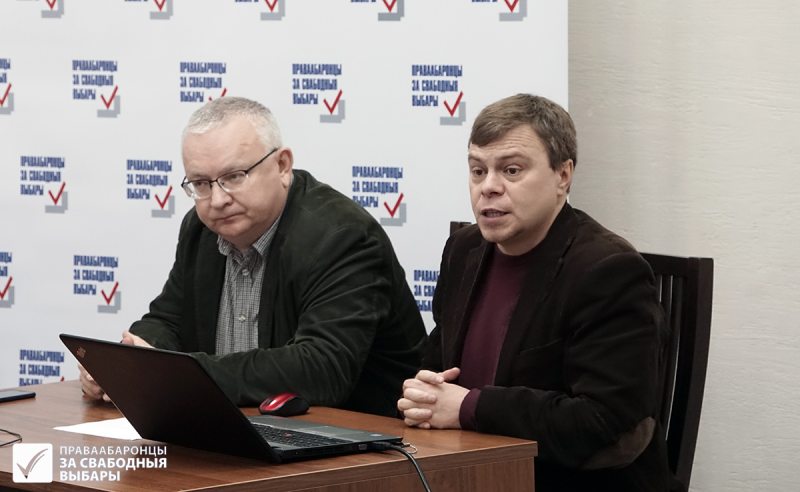Decline of political race and total fraud. Human rights activists sum up observation of parliamentary elections

The parliamentary elections were once again marred by gross violations of both Belarusian legislation and international standards, representatives of “Human Rights Defenders for Free Elections”, a nation-wide election observation coalition, said at a press conference in Minsk.
Aleh Hulak (Belarusian Helsinki Committee) and Uladzimir Labkovich (Human Rights Center "Viasna") say each electoral phase (formation of election commissions, registration of candidates, campaigning, early voting and Election Day) deserves severe criticism.
Formation of election commissions
The experts stress that the opposition is still heavily underrepresented in the election commissions of all levels (regional, district, and polling stations). For example, only 2.8% of the district commissioners were representatives of opposition parties. In the precinct commissions, the opposition won 4.2% of the seats, marking an all-time record low in parliamentary elections.
Political parties (pro-government parties included) play a minor role in the formation of election commissions. More than half (58.80%) of the district election officials in this year’s elections were representatives of civil society groups, with members of political parties occupying as few as 14% of the seats. For the precinct commissions, the situation is even worse, as the parties only account for a pitiful 6.5%.
The bulk of election officials are government employees migrating from one commission to another. Their performance is closely watched by the executive, say the observers. In the overwhelming number of cases, they are co-workers (e.g. school staff), and are likely to remain silent with all the blatant abuses in place.
Registration of candidates
Aleh Hulak, coordinator of the non-partisan domestic observation campaign, notes one of a handful of positive developments in this year’s elections, which is the increase in the number of registered nomination groups and, at the same time, the lower amount of failed registrations.
In addition, there has been a formal strengthening of the role of political parties in the process of nomination of candidates. This year, 52% of the candidates were nominated by political parties, and 33% nominations were supported by collecting signatures. However, the activists report fewer nominees from the opposition, as compared to pro-government structures. Similarly, nominees from the opposition faced more refusals of registration than their pro-regime rivals.
The campaign’s experts say that the observers could not see the signature verification process in 71% of the cases.
“We have repeatedly called to reform the procedure. It helps deny registration to some candidates, at the same time, ignoring the same mistakes from the other candidates,” Aleh Hulak said.
Election campaigning
The experts deplored the extremely low activity of some candidates. In particular, there were ten times less requests to arrange street events than in 2016.
There was a sharply increase in the number of candidates deprived of their registration at the stage of campaigning. Only 2 candidates were deregistered in 2012 and 2016 taken together, while 14 were removed from elections in 2019. Most were penalized over “inciting social hatred” in their flyers, electoral platforms, and television appearances.
Uladzimir Labkovich believes that the authorities applied a loosely interpretation of “inciting social hatred” and “calls to change the constitutional order.” The actual reason, in his opinion, was downgrading the political essence of campaigning.
“In fact, opposition candidates were limited in their ability to criticize their opponents. There were absurd situations when a candidate was removed for saying that “with Lukashenka, there is no future,” or calling to impeach the president.
The authorities turned the elections, which should be a competitive political process, into a contest for the best social worker. All political agenda was strictly forbidden. The entire situation is evidence of a decaying political life in the country, in particular, the parliamentary elections,” Labkovich said.
Early voting
The campaign’s activists call the electoral phase a “tragic page,” after the CEC announced an unprecedented turnout, 35.77%, of early voters. Given the overall turnout reported at 77.2%, it turns out that half of the ballots were cast in the five days before Election Day. The record figures are solely due to voter coercion and overstated turnout, the observers say.
“What we witnessed this year was unprecedented coercion to vote early,” says Uladzimir Labkovich. “72% of our observers reported cases of voter coercion. Every third case involved threats. In some cases, psychological violence was used against voters.”
The official turnout was heavily inflated, too. Every second polling station was marked by overstated voter turnout. In separate cases, the figures failed to add up by 2, 3, 5, and even 11 times.
“Falsification was so widespread that following the actual turnout was impossible,” says the human rights activist.
Election Day
On November 17, it was home voting that was used to rig voter turnout. Many voters were visited by election officials, although they had not requested a mobile ballot box to be delivered to their residence. As a result, violations were reported in 60% of cases, as election officials went from apartment to apartment persistently inviting everyone to vote using the travelling box.
The counting of votes was no surprise, either, according to the domestic observers. In 98.7% of the polling stations, vote count was not transparent. Therefore, it would be wrong to say that Belarusian citizens could exercise their active right to vote.
All this made “Human Rights Defenders for Free Elections” conclude that the elections failed to meet a number of key international standards for free and democratic elections.
Full findings by the domestic observation campaign will be soon available in the final analytical report on the results of observation.

